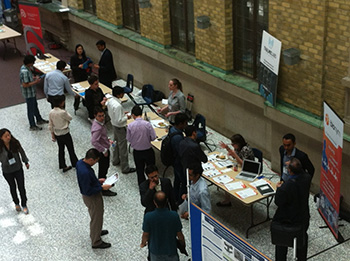May 8, 2013
Graduate students joined with industry at this year’s Connections Symposium, hosted Tuesday, May 7 in the Bahen Centre for Information Technology at University of Toronto.

Apkarian presented his dream of increasing industry collaboration and cross-over by updating the university education model to be more project-based and solutions-oriented. “It’s very challenging to change the system,” said Apkarian. “But you know what? It’s going to change whether they like it or not. This is the way of the future.”
Graduate students showcased their work in presenations, poster summaries and poster sessions. PhD candidate Jason Grenier received the award for best oral presentation on his work, titled ‘Three-dimensional optical circuits in fibers: New frontiers in ultrafast laser fabrication.’
The program culminated in a panel discussion on the differences between research and innovation, the role of universities in driving innovation, and what cultural shifts need occur for Toronto to become an innovation hotbed on par with Silicon Valley. On the panel were Fabio Almeida of U of T’s Innovations & Partnerships Office, Nilay Goyal of of U of T’s Creative Descruction Lab, John MacRitchie of Ontario Centres for Excellence, Vaughn Betz, ECE professor and co-founder of Right Track CAD, and Parham Aarabi, ECE professor and president and CEO of ModiFace Inc.
Attendees probed the panellists for their thoughts on the respective roles of academic institutions, government and private companies in generating innovation. Questions arose around what graduate students should be trying to achieve during their master’s or PhD programs—should the goal always be to produce a commercializable product? Opinions differed.
The panellists agreed that in order to foster a Silicon Valley-type of entrepreneurial environment, Canada, and Toronto, needs to undergo a major cultural shift. That will be a slow change, but the first steps have already been taken.
“The Valley tends to support, encourage and even expect that kind of [entrepreneurial] activity,” said MacRitchie. “It isn’t about turning everyone into an entrepreneur, but it is about making it easier for people to do it.”
 Panel, left to right: Almeida, Goyal, MacRitchie, Betz and Aarabi.Industry sponsors Intel, CMC Microsystems and IEEE Toronto also presented. Interaxon presented a technical talk. Students presented posters throughout the day, and the evening concluded with a dinner banquet and award presentations.
Panel, left to right: Almeida, Goyal, MacRitchie, Betz and Aarabi.Industry sponsors Intel, CMC Microsystems and IEEE Toronto also presented. Interaxon presented a technical talk. Students presented posters throughout the day, and the evening concluded with a dinner banquet and award presentations.
Connections 2013 was chaired by ECE students Siddarth Hari and Zahid Chowdhury, with support from an organizing committee made up of graduate students in The Edward S. Rogers Sr. Department of Electrical & Computer Engineering. Sponsors included Intel, Altera, CMC Microsystems, and the Graduate Students’ Union.
More information: http://www.eecg.toronto.edu/~exec/connections2013/Connections2013.htm
Media contact:
Marit Mitchell
Senior Communications Officer
The Edward S. Rogers Sr. Department
of Electrical & Computer Engineering
416-978-7997; marit.mitchell@utoronto.ca